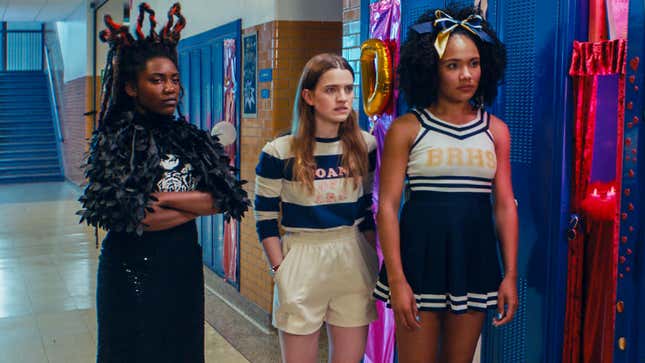In Knives and Skin, the Lost-Girl Trope Turns Surreal and Overtly Femme
Entertainment
Image: IFC Films
Carolyn Harper, the missing girl at the center of the rather loose plot of Knives and Skin, is only the most pressing and obvious of her hometown’s problems. Jennifer Reeder’s beguiling new film, at first blush, fits firmly into the neon teen wave of contemporary pop culture (think Riverdale, Euphoria, Waves). Like this year’s gonzo sendup of suburbia, Greener Grass, Knives and Skin owes a considerable debt to the work of David Lynch. But Reeder’s effect, while plenty weird, isn’t quite absurd for comedic effect—it is, in fact, at times earnest in the emotions that underpin its bizarreness.
A tiger T-shirt talks to an adult who is so depressed she’s practically bedridden. A teen has a side hustle of selling her mother’s underwear to teachers. A pair of glasses seems to possess magical powers. Girls wear couture to their high school in rural Ohio, and sometimes t-shirts emblazoned with the names of feminist icons like Angela Davis and Yoko Ono. An acapella choir sings tightly harmonized ’80s hits like New Order’s “Blue Monday” and the Go-Go’s “Our Lips Are Sealed.”
It’s the rather elliptical brainchild of Jennifer Reeder, a writer-director who calls herself “the impossible lovechild of Maya Deren and Steve McQueen” and whose art-world roots grow above the soil. “I studied filmmaking at art school, where in terms of your creativity, there’s not a lot of rule-following, in terms of commercial viability,” she told Jezebel via phone in November. “I’ve always loved that kind of wacky, unrealistic freedom.” It shows. Shot over the course of 25 days in the summer of 2018 in Lamont, Illinois, with a cast of locals, Knives and Skin is a feminist reclaiming of certain pop culture tropes and depictions, an ode to female friendship, a meditation on bodily ownership in a world you don’t control. It’s dreamlike, prioritizing mood over logic and atmosphere over traditional plot structures. Reeder discussed the difficulty she had getting funding for such an audacious project, her inspirations, and why she thinks coming of age is a lifelong process. An edited and condensed transcript of our conversation is below.
JEZEBEL: How did you envision this movie at the start of its creation?
JENNIFER REEDER: Leading up to Knives and Skin, I made a bunch of short films that were related thematically. They’re the distant, smaller cousins of Knives and Skin. They’re often about the lives of girls and women; they suggest coming of age is a lifelong process. There’s usually some sort of dark element, someone missing for instance. People sing. Things float and glow. Perhaps all of the things that people love or hate about Knives and Skin, I’ve worked out through my short films.
I live just outside of Chicago in the Northwest tip of Indiana, and my mother lives in Ohio, so I often drive out to see her, which takes me through these long, winding two-lane rural roads. It’s a very specific landscape, one that hasn’t aged. [While driving], I was imagining a group of goth-punk girls walking along this rural road, for instance on their way to school or band practice. I started getting curious: Who are these girls? What is about to happen to them that will change their lives forever? The combination of that visual and that question is how the whole story spiraled out.
We should get together and decide you’re not allowed to come of age until you’re 38, at the very least.
You just said, “Coming of age is a lifelong process.” Can you elaborate?
It’s ridiculous that we expect ourselves and others to have this kind of coming of age when we’re still children, really. We should get together and decide you’re not allowed to come of age until you’re 38, at the very least. We have to decide what our lives are when we’re children. And then if you decide at any point after that that you want to make a dramatic shift in your life, we just don’t have positive terms to describe that. Saying that someone’s having a midlife crisis because they’re reconsidering the path of their life, it’s such a negative term. The way we evolve as humans is to really examine our lives and allow ourselves to change our paths and to make mistakes and to learn from those mistakes, rather than carrying the burden of that mistake around until we die. It’s totally unrealistic in terms of healthy, human evolution.
-

-

-

-

-

-

-

-

-

-

-

-

-

-

-

-

-

-

-

-

-

-

-

-

-

-

-

-

-

-

-

-

-

-

-

-

-

-

-

-








































